 Petzlover
Petzlover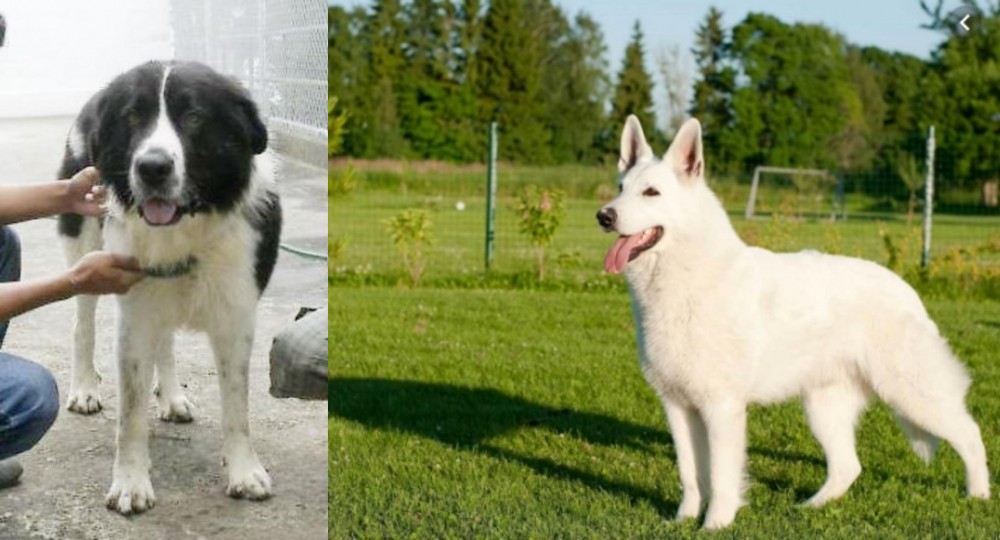 Mucuchies is originated from Venezuela but White Shepherd is originated from United States. Mucuchies may grow 6 cm / 3 inches higher than White Shepherd. Mucuchies may weigh 21 kg / 47 pounds more than White Shepherd. Both Mucuchies and White Shepherd has almost same life span. Both Mucuchies and White Shepherd has almost same litter size. Mucuchies requires Low Maintenance. But White Shepherd requires Moderate Maintenance
Mucuchies is originated from Venezuela but White Shepherd is originated from United States. Mucuchies may grow 6 cm / 3 inches higher than White Shepherd. Mucuchies may weigh 21 kg / 47 pounds more than White Shepherd. Both Mucuchies and White Shepherd has almost same life span. Both Mucuchies and White Shepherd has almost same litter size. Mucuchies requires Low Maintenance. But White Shepherd requires Moderate Maintenance
 The Mucuchies are a breed born in the Venezuelan mountains, in the late 1700s. They are rare today but were popular in the mountains for hundreds of years. They are believed to be a cross between the dogs brought by the Spanish Conquistadors in the 14th and 15th centuries and the local dogs. However, by the 1960s this rare breed was close to extinction.
The Mucuchies are a breed born in the Venezuelan mountains, in the late 1700s. They are rare today but were popular in the mountains for hundreds of years. They are believed to be a cross between the dogs brought by the Spanish Conquistadors in the 14th and 15th centuries and the local dogs. However, by the 1960s this rare breed was close to extinction.
Bred primarily as herders and watchdogs, their ancestry likely included the Algerian Mastiff, the Spanish Mastiff, the Great Pyrenees, and the Atlas Shepherd, otherwise known as the Aidi. The early development of the Mucuchies is attributed to Wilender Ferrari, DVM. At the time, Simon Boliva was fighting for Venezuelan independence in the city of Mucuchies. He adopted a member of the breed and named it for the city. The name stuck as the name for the breed.
Later in this timeframe, the Mucuchies was crossbred with the Pyrenean Mastiffs that friars brought to the Andes from their monasteries. With them, they also brought the sheep for the dogs to herd and guard. During the 1920s the breed spread throughout the country, but by the beginning of the 1960s there was a major decline in the breed. This was partly due to changes in culture and lifestyle in the Andes.
In 1961 a Mucuchies club was formed for the breed preservation and the breed was formally named the National Dog of Venezuela. The club was disbanded in the mid-1960’s and this led the breed to the edge of extinction. By 2008 there was another major push to save the breed. This effort came from the government who wanted to preserve the breed. In 2008, they created the Fundacion Nevado and sent six Mucuchies to the Waraira Repano Cable Car System in the El Avila National Park so that the dogs would be in a climatic environment as similar to the Andes mountain as possible. This was successful and the program was increased by Venezuelan President Hugo Chavez.
As the breed continued to develop the shepherding instincts were lost and the guarding aspects were strengthened. This left today’s Mucuchies as a breed of gentle, active dogs with strong characters and a loving disposition. They are gentle with their families but protective and aggressive with strangers. They are the only native breed of Venezuela and currently, there are programs in the mountains to re-establish and strengthen them.
In addition to their name for the town of Mucuchie, the breed is also called the Paramo’s Dog or the Snowy. These programs exist because in Venezuela they are near extinction once again. This is the result of inbreeding and more cross-breeding, this time with larger dogs like St. Bernards. Thus, the continued efforts by the Nevado Foundation with the assistance of the government to restore the original Mucuchies breed to Venezuela.
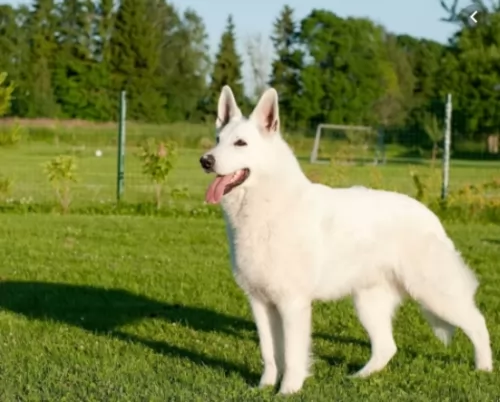 The German Shepherd and the white German Shepherd are the same dog - the only thing is that their coat colors vary.
The German Shepherd and the white German Shepherd are the same dog - the only thing is that their coat colors vary.
The White Shepherd evolved because people were looking for a working companion dog with a high degree of intelligence and a white coat.
The development of the White Shepherd began at the time of the 19th and 20th centuries. A breeding program was started but in 1933, the white coat color was made a disqualification in the German Shepherd Dog breed standard.
Not to be deterred, it was in 1969 that the U.S. and Canada formed White German Shepherd breed clubs and the breed was actually recognized by the UKC in 1999.
 The appearance of the Mucuchies is that of a breed of large dogs who stand two feet at the shoulder and can weight one hundred pounds. They have a deep chest, heads that are wedge-shaped and skulls shaped like domes. Their muzzles are straight, and their nostrils are large on their black nose. The Mucuchies have dark eye and eyelids along with ears that are triangular in shape and medium in size. Their lips are black but this and he has a well-developed ruff.
The appearance of the Mucuchies is that of a breed of large dogs who stand two feet at the shoulder and can weight one hundred pounds. They have a deep chest, heads that are wedge-shaped and skulls shaped like domes. Their muzzles are straight, and their nostrils are large on their black nose. The Mucuchies have dark eye and eyelids along with ears that are triangular in shape and medium in size. Their lips are black but this and he has a well-developed ruff.
They are large, sturdy dogs with a grand appearance and tremendous energy. Their neck is strong, short and very muscular with wide shoulders and a straight back. The tail is much longer than their hocks and it is shaped like a fan and he raises it when he is alerted. They have a short, thick coat and most are white or white with gray, honey or black. This is a very attractive breed.
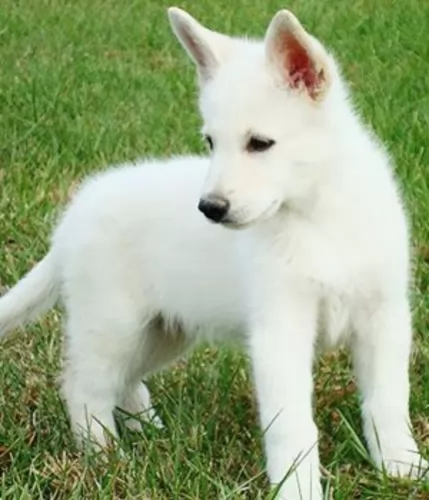 The White Shepherd is a true beauty and is a medium to large-sized dog that is muscular and strong. He stands at between 55 and 65cm in height and weighs between 35 and 40kg.
The White Shepherd is a true beauty and is a medium to large-sized dog that is muscular and strong. He stands at between 55 and 65cm in height and weighs between 35 and 40kg.
He is somewhat longer than tall. The double coat is medium length, dense, straight and white. He is a fairly heavy shedder. He has an intelligent face, a long muzzle and erect ears. The long tail is low-set.
This beautiful dog’s face tells you that he is highly intelligent. He can be easily trained. The bright eyes are eager and alert and he is ready to be an excellent guard dog and take his role as protector and guardian seriously.
The White Shepherd loves his human family and isn't overly enthusiastic around strangers. They’re playful dogs and will make great playmates for children. They also aren’t aggressive with other dogs and will get on well with other pets in the house.
 Good with children and very good with their own families. Might be a little standoffish with others.
Good with children and very good with their own families. Might be a little standoffish with others.
They no longer have the strong herding instinct but are outstanding guard dogs.
Yes but need land to run in. Don’t put this giant dog in an apartment. You will both be miserable.
Very intelligent and their ability and willingness to learn is very good.
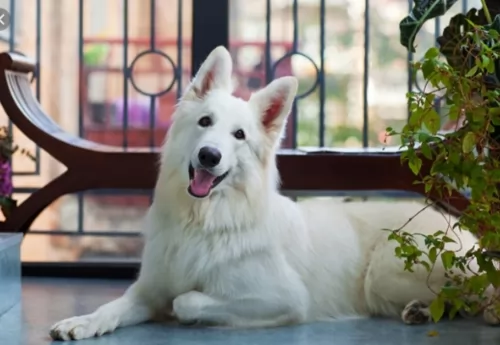 The White Shepherd is such a beautiful dog and he has some great characteristics to match his good looks.
The White Shepherd is such a beautiful dog and he has some great characteristics to match his good looks.
He is friendly and amicable with his human family and is a great protector as well. He isn’t aggressive yet he makes a great watchdog.
He is loving and loyal and forms strong bonds with his human family. Bringing him into your home and heart is guaranteed to confirm the opinion held that dogs are man's best friend.
 Because of their rarity and somewhat isolation, they do not have many genetic health concerns. They do however face at least a couple of the issues that most large dogs face.
Because of their rarity and somewhat isolation, they do not have many genetic health concerns. They do however face at least a couple of the issues that most large dogs face.
This can be a serious issue for such a large dog. It can cause arthritis and lameness.
This might be the biggest threat to the Mucuchies’ health. They are big dogs and if they injury limbs it can be quite serious.
The distension or inversion of the stomach and intestines is potentially fatal and must be treated immediately. Large dogs are prone to bloat and feeding schedules can go a long way in preventing it.
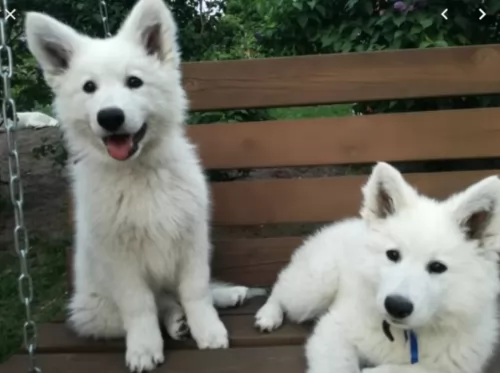 The White Shepherd shares health problems much the same as the German Shepherd, and one of these is hip dysplasia.
The White Shepherd shares health problems much the same as the German Shepherd, and one of these is hip dysplasia.
These dogs are at risk of getting hip dysplasia. It’s a congenital disorder with dogs inheriting the disease from their parents. Some young dogs can get the disease too. Because they are such active dogs, the White Shepherd is at risk of dysplasia. There are a number of signs you can look for in your dog and some of these are -
Your vet may want x-rays to examine your dog's hips. Your vet will want to slow the development of the disease and also ease the pain in your pet. There are other steps the vet will suggest to you that can make it as comfortable as possible for your pet.
 As mentioned in health concerns, feeding appropriately is critical to the Mucuchies’ health. Puppies need a high quality, large breed dry food 2-3 times per day at ½ cup each time. Don’t overfeed. Don’t exercise before or after eating to prevent bloat.
As mentioned in health concerns, feeding appropriately is critical to the Mucuchies’ health. Puppies need a high quality, large breed dry food 2-3 times per day at ½ cup each time. Don’t overfeed. Don’t exercise before or after eating to prevent bloat.
The adult Mucuchies should eat at least twice a day for a total of two and one-half cups. So, you might feed one and ¼ cup at each meal. Again, it is critically important that you don’t overfeed. Don’t feed before or after strenuous exercise and don’t let your Mucuchies eat too quickly in order to avoid bloat.
This is a large dog with generally very good health. His stamina and heart will impress you.
The Mucuchies is not an active inside dog, but he is a large dog that needs daily exercise. They need to be able to run or at least to trot. A large yard or dog bark is necessary. However, this big, double coated dog hates the hot weather and needs a cooler climate. Winter is fine with him. Don’t overwork them while they are growing. Walks are the best exercise for this breed.
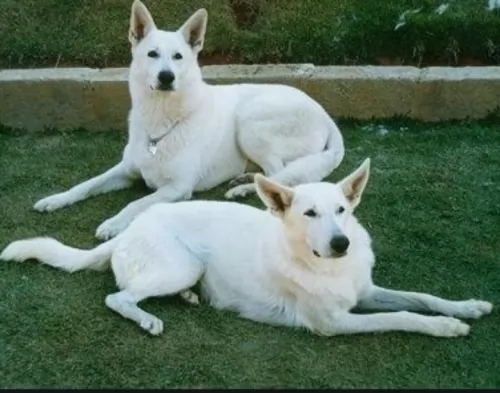 The White Shepherd's weather-resistant double coat will need to be brushed regularly as he is quite a heavy shedder. When brushing him, check for ticks and fleas as well as any unusual lumps.
The White Shepherd's weather-resistant double coat will need to be brushed regularly as he is quite a heavy shedder. When brushing him, check for ticks and fleas as well as any unusual lumps.
This beautiful dog was developed from a herding breed so he is very active. He will love a walk every day but that won’t be sufficient. He just loves ball games, and if you take him to the park, he’ll love you throwing sticks for him or the frisbee.
Because of his intelligence, he will require mental and physical stimulation. You get some toys for dogs where you can put some kibble in the toy and he has to figure out a way to get the food out.
The White Shepherd is an active dog, so to keep him that way, ensure he gets good food which has the right balance of vitamins.
There are good commercially manufactured dog foods on the market, but the idea is to know how to choose the high-quality ones and to avoid the ones that can actually jeopardize your dog’s health.
Always read the write-up on the packaging and choose according to your pet’s age and his activity levels.
It is always a good idea to give such a dog some home-made food too. Not any kind of home-made food either because you have to be careful with dogs to avoid them suffering from abdominal pain. They like their food plain and simple – boiled chicken, brown rice and vegetables.
Some raw meat occasionally is also good. Don’t forget to ensure a constant supply of cool, fresh water.